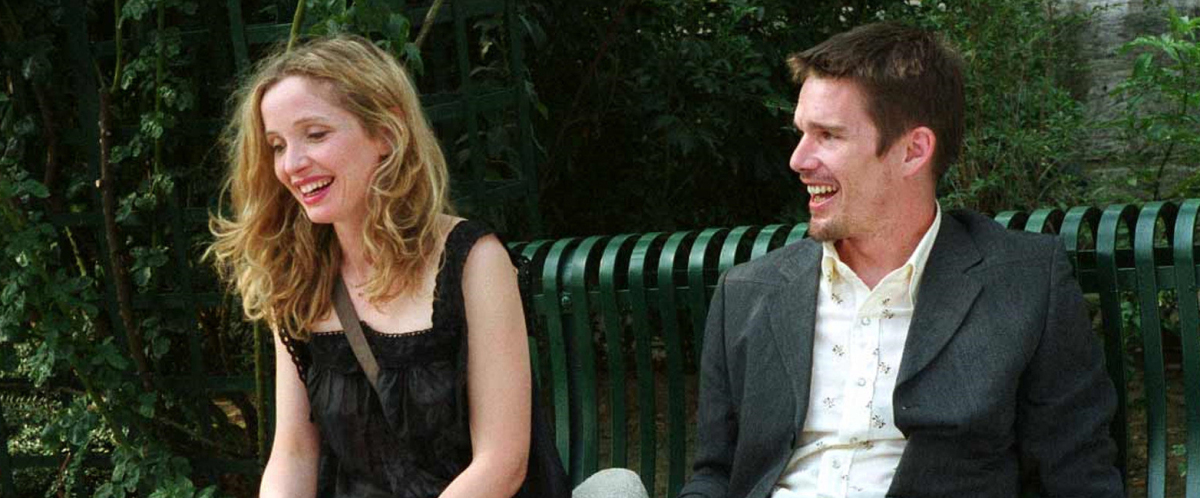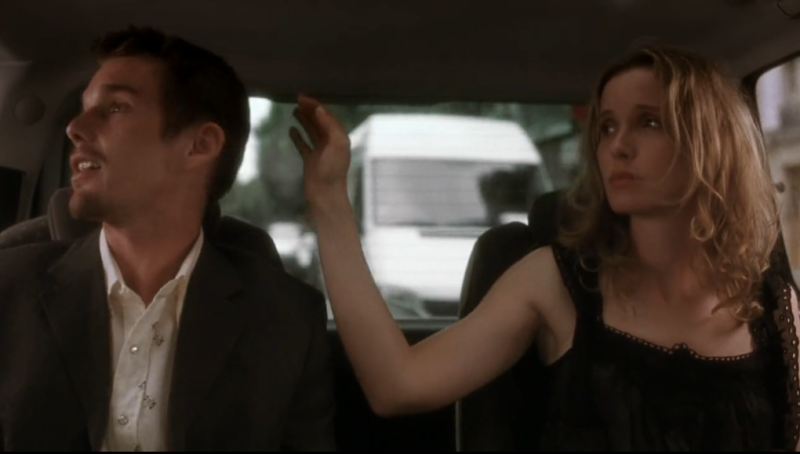“Forget the original—just get a good copy.” - James Miller
We open on an author’s event, a small crowd listening intently to our male lead discuss his new book. He is charming, intelligent, and perhaps a bit full of himself. In attendance is our female lead, portrayed by a beloved French actress with ties to the Polish master Krzysztof Kieślowski. She is here because she is curious about the book and even more curious about the man. You see, the two share a passionate history—old flames from years, if not quite lives, prior. Soon we will be whisked away from this book signing and plunged headfirst into the neuroses of these former lovers, as they walk and talk against a strikingly beautiful European backdrop. Their names are Jesse (Ethan Hawke) and Celine (Julie Delpy), and the film is Richard Linklater’s eternal classic Before Sunset.
Or perhaps not. What if instead their names were Elle (Juliette Binoche) and James (William Shimell), and the film is Abbas Kiarostami’s elusive masterpiece Certified Copy? How could you know from the description alone? In truth, you couldn’t. So striking are the similarities between these two films that they practically beg to be compared. Both explore romance—what it means to be in love and how the passage of time can both dilute and amplify the passion of a relationship—and operate in similar modes, primarily conveying their ideas through animated, often philosophical back-and-forth conversations. And while Kiarostami and Linklater are vastly different writers, at their core both are poets blessed with the gift of gab, born to create and document human interaction. Who better to write these conversations?

Of course, there are key differences between the two couples. Prior to the events of Sunset, Jesse and Celine had only spent a day together, which we know because of the previous film in the trilogy, Before Sunrise. And as passionate and utterly engrossing as their time in Vienna was, it was still just twenty-four hours. Hardly a relationship. In contrast—though the particulars are shrouded in mystery—Elle and James clearly share a long, complicated past. In fact, it’s all but confirmed in the film that they have a son together. A son!
And yet for the first half of the film, we’re led to believe that this is the first time these characters have met. By pulling this trick, Kiarostami displays the whole spectrum of a failed relationship, from simple beginnings to a tragic end within a single day, in effect positioning Elle and James not just as two people with shared intimacy, but as cinematic mirrors, reflecting the very notion of romance itself. In this manner—to bring in a central theme of the film—they are copies: copies of the husband and wife tandem Elle consults in a quaint, fountained courtyard; copies of the newlyweds they take a picture with at a popular tourist destination; copies of the ancient couple they see strolling out of church, arms linked, bones trudging against time; and yes, copies of Jesse and Celine, star-crossed lovers were given a second chance.
One of the most noticeable things about Jesse and Celine is how handsy they are with each other. They routinely touch the other’s arm, shoulder, what have you, as if they’d been together all these years. Jesse even sweeps Celine up off her feet at one point—literally. These moments augment the palpable tenderness established between them in Before Sunrise. As syrupy as it may seem, small gestures like this convey true affection. A simple tap on the shoulder is more than just that; it’s the currency of love, the subtle acknowledgment of one’s presence. The old husband by the fountain says as much in Certified Copy when he pulls James aside to offer “a piece of fatherly advice.” At this point, they’ve not spent five minutes together and already the old man can tell how fractured Elle and James’s relationship is. Then, after saying their goodbyes, James takes the old man’s advice to heart and places his hand on Elle’s shoulder as they walk away in silence. It is notably the only moment where James initiates any sort of embrace, simple as it may be (they share a moment outside of a hotel, featured in a picture above, but Elle is the instigator). Needless to say, it isn’t very convincing.

It is also, in many respects, a direct mirror of one of the most affecting moments in Before Sunset: Jesse’s backseat bombshell regarding his recurring nightmares about Celine. The anguish in his voice is profound, as he shakes and groans through the admission. He is not a happy man, his loveless marriage solely buoyed by the existence of his son, whom he “would suffer any torture to be with for all the minutes of his life.” Celine is understandably moved by this revelation, her face fraught with emotion as his words resonate. In spite of, or perhaps because of, how pained and tortured the moment is, it is clear that this is a confession of love on the deepest level. And how does she respond? By reaching for Jesse’s head. It’s brief, and in the end, she never makes contact, opting to pull back at the last second. Jesse doesn’t even notice, his back turned. Crucially though, we do, and we know it’s as sincere as any action ever committed to film. No one prompting her, no one offering her advice. Just pure instinct. Pure love.
That sincerity is at the heart of the Before trilogy’s appeal. People love these films because of how real they feel. But it’s also at the heart of Certified Copy’s central conceit: that all art, especially cinema, is a reflection of the real world. But art in and of itself is part of the real world. Therefore, the film posits that art is not merely a mirror, but many mirrors, each informing the rest, reality and fiction blending into one (not unlike Kiarostami’s landmark Close-Up). Even language is a mirror, as the film constantly switches between English, French, and Italian, sometimes for practical reasons, but usually just for the sake of it. By deconstructing the various stages and modes of a relationship over the course of a single film, Kiarostami reveals the thematic connection not just between Certified Copy and Before Sunset, but between it and seemingly every film ever made about a romantic couple, which were themselves influenced by any number of factors relating to art and reality. And on and on it goes.

Take that scene in the car again. Hopefully, by now I have established how Elle and James are mirrors of Jesse and Celine (if I haven’t—well, shit). But dig deeper. Is there another reflection lurking amidst that scene? I’d argue there is. If anything, Elle and James more closely resemble Jesse and his unnamed wife than they do Jesse and Celine. Think about it. The son. The emotional distance. The failed marriage. They’re practically dead ringers. Now dig even further. The squabbling. The arguments about parenting and the nature of love. The hotel room. Remind you of anyone? How about Jesse and Celine nine years later, in Before Midnight, a film that came out three years after Certified Copy?
And therein lies the film’s genius: it’s future proof. Whereas Before Sunset depicts the middle chapter of a timeless love story, featuring clearly defined characters and desires, Certified Copy purposefully obscures itself so as to be able to live up to its title. Like the mysterious transformation undergone by its protagonists, Certified Copy is in a state of constant metamorphosis. No, that doesn’t mean the film’s content will be different upon a rewatch. Of course not—everything is set in stone from the jump. But as with all mirrors, the form is only part of the equation. It’s not until you hold something up to it that its true purpose is revealed. And what is Certified Copy’s true purpose? In the words of Arcade Fire, it’s just a reflection of a reflection of a reflection of a reflection of a—well, you get the idea.
